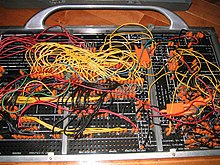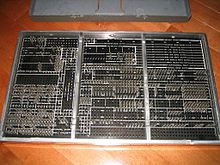

A plugboard or control panel (the term used depends on the application area) is an array of jacks or sockets (often called hubs) into which patch cords can be inserted to complete an electrical circuit. Control panels are sometimes used to direct the operation of unit record equipment, cipher machines, and early computers. The array of holes is often contained in a flat removable panel that can be inserted into a machine and pressed against an array of contacts. This allows the machine to be quickly switched between different applications.
The contacts on the machine are hard wired to the various devices that comprise the machine, such as relays, counters, inputs from each card reader column, outputs to a card punch column or printer position, and so on. The wiring on a plugboard connects these devices to perform a specific function, say reading cards and summing up the numbers punched in a group of columns. A modern comparison would be a field-programmable gate array (FPGA), with the plugboard serving the same purpose as the wiring layer in the FPGA.
- ^ IBM Accounting Machine: 402, 403 and 419 Principles of Operation. 1949. 22-5654.